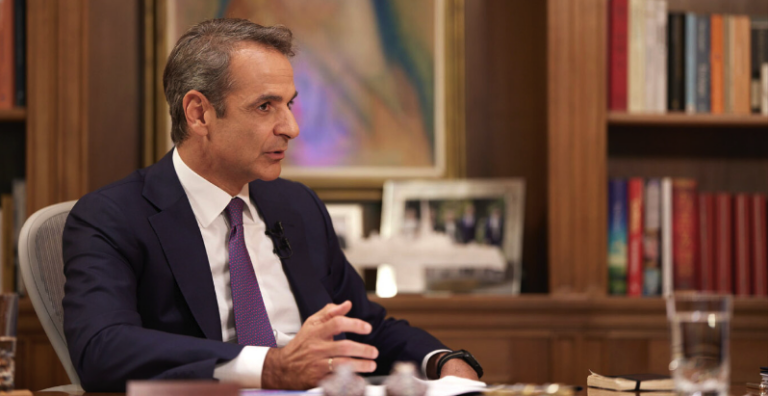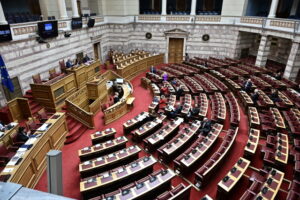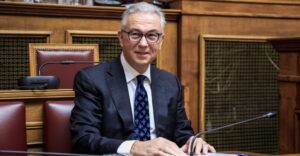The timing of the manifestation of Mitsotakis’ initiatives is still fluid, however. According to his associates, the prime minister wants to study the data and his choices, to evaluate the persons who are currently in the cabinet, but also those who are in the “tank” of ND.
To do this, therefore, 2-3 more days are needed. Mitsotakis, according to one line of information, could make a move at the end of this week. Of course, his mention on Alpha yesterday that the cabinet meeting scheduled for Friday will be held with the current composition “indicated” a slight postponement of developments until next week. On the other hand, Mitsotakis’ next sentence left a…window.
“You ask me a question which you have an obligation to ask and I give you the answer which I also have an obligation to give you,” said the prime minister, who will be in Switzerland from Saturday for dinner at the International Conference on Ukraine, on Sunday will participate in its proceedings and on Monday will leave for the informal meeting of EU leaders in Brussels.
Targeted changes
Mitsotakis confirms to interlocutors that he will make corrective moves in the government’s structure, but points out that “I am not making changes for the sake of changes”. “Quick moves yes, hasty moves no,” he adds, wanting to show that at this stage he wants to make a substantial intervention in the governmental shape at a crucial turning point for the government.
“So if some people have seen the world from too high – 41% is too high – it is time to see it from a little lower. That’s not a bad thing,” Mitsotakis told Alpha yesterday, sending a clear message inside his government. “In no time at all I have said that I evaluate efficiency and behaviour,” he added, with broad changes in the government’s shape expected. The issue, of course, is not quantitative, but qualitative.
In other words, Mitsotakis wants the changes he makes to show that he has got the message and that he is intervening in critical areas, such as inflation or the relationship with the rural world. In other words, one could talk about the “reshaping of everyday life”.
Of course, there are also top ministers who are expected to remain unmoved. Examples of such are the three who saw the prime minister on Monday, George Gerapetritis, Kostis Hatzidakis and Adonis Georgiades.
In the same vein, Nikos Dendias, Michalis Chrysochoidis, Lina Mendoni, Sofia Zacharaki, Kyriakos Pierrakakis and others. On the other hand, there will be changes in the positions of ministers – and with exits from the scheme – but also in those of deputy ministers, while promotions cannot be ruled out.
Kasselakis: Launching an Anti-Extremist Foundation in Greece and New York
Maximou and the blue “reserves”
In any case, the major issue is what will happen to the Maximou. Despite the scenarios that have been circulated in recent hours, the movement of Aki Skertzos to a ministerial post does not seem to be a likely scenario, with Mitsotakis speaking in praise of the system of control and supervision of government work that will be a legacy for future governments.
However, everyone notes the need to strengthen the government staff with at least one person with strong political characteristics who will also have a relationship of trust with Mitsotakis. Such persons, however, are not easy to find, hence Mr Mitsotakis needs time.
Yesterday, the Prime Minister had a detailed discussion with the communication expert Thomas Varvitsiotis, who was a member of the “blue” team during the pre-election period. In the afternoon, the general director of the New Democracy party, Yannis Smyrlis, arrived at Maximou and briefed the prime minister on how the party apparatus moved during the pre-election period.
In any case, it is reasonably estimated that the members of the Southwest who will enter the government will constitute the overwhelming majority and that Mitsotakis is unlikely to experiment again. Already, several MPs are ‘sitting on the coals’, while younger MPs are expected to be used for the first time.
However, Mitsotakis yesterday rejected the “dilemma” between a “right turn” and “centrist persistence”. “This is not our question, whether we go to the centre or whether we go to the right.
It is whether we will be more effective, whether we will implement with greater speed the programme for which we were elected,” the prime minister said meaningfully, sending a message to Southwestern party officials who are also placed on TV panels.
Ask me anything
Explore related questions





